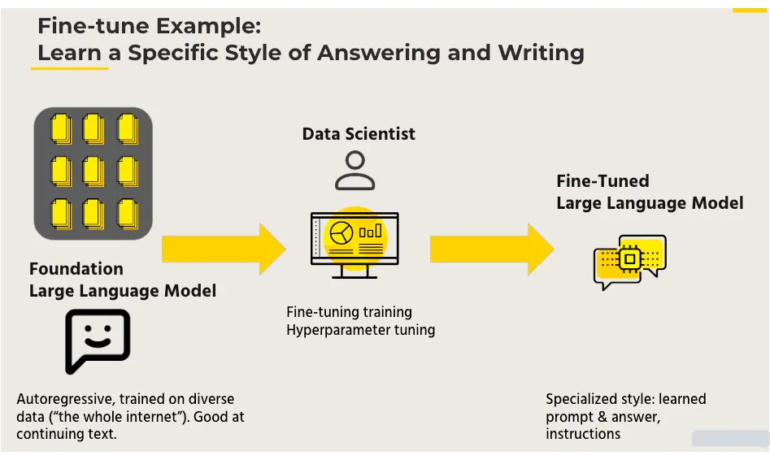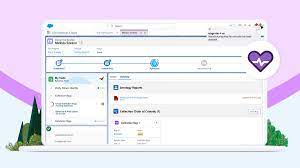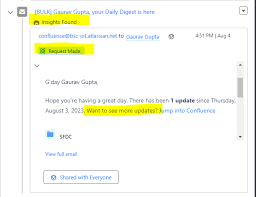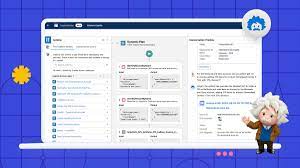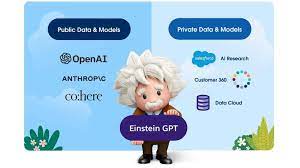It’s more likely that you vacationed on Gilligan’s island than remain unfamiliar with ChatGPT. Since its introduction, this tool has emerged as an essential extension to Salesforce solutions, owing to its remarkable generative AI capabilities. From automating content creation to validating rules ChatGPT excels in some areas. By crafting Apex code, developing Lightning Web Components (LWC), summarizing conversations, and composing knowledge articles, ChatGPT has demonstrated its value. The integration of Chat GPT and Salesforce holds the potential to streamline substantial segments of organizational processes, leading to significant time savings. This not only enhances CRM data management, now fortified by generative AI, but also elevates the customer experience to unprecedented heights. While Salesforce has its own Einstein AI tools, Chat GPT and Salesforce remain a viable tool combination. This article will explore in detail how ChatGPT can seamlessly integrate with Salesforce. Understanding ChatGPT: When I questioned ChatGPT about its nature, and its response is as follows: ChatGPT is a language model created by OpenAI. It operates as a deep generative language neural network, having been trained on an extensive volumes of text to generate coherent and meaningful responses to user queries and commands. In essence, ChatGPT is essentially a chatbot, akin to Einstein bots. However, it distinguishes itself with its robust capabilities. Developed on the OpenAI GPT-3.5 family of large language models, incorporating both supervised and reinforcement learning techniques, ChatGPT has been trained on an extensive dataset of internet text up until January 2022. It excels in natural language processing tasks such as text generation, question answering, translation, and text classification. The underlying technology of ChatGPT is sophisticated, evolving continually through the application of machine learning and deep learning techniques. In 2023, OpenAI introduced two new models: ChatGPT-3.5 Turbo and ChatGPT-4, with the latter being notably superior. For instance, GPT-4 is multimodal, adept at processing both textual and visual inputs, comprehending and describing images effectively. It has also reduced the likelihood of generating nonsensical or “AI hallucinations” by 19-29%. In terms of security, GPT-4 incorporates robust measures from the outset, generating only 0.73% “toxic” responses compared to GPT-3.5’s 6.48%. It excels in maintaining context, with enhanced memory of the conversation, and improved context length to handle more extensive inputs. In summary, the mentioned improvements position GPT-4 as a more advanced and versatile option. ChatGPT Models: Every AI tool relies on models to discern patterns and make decisions from data. The OpenAI API is powered by a family of models with distinct capabilities and pricing scales. Users can also tailor their base models for specific use cases. The primary models include: This serves as a brief overview, and further exploration is possible here. OpenAI retires old models to introduce safer and more advanced versions. When a model becomes obsolete, it is promptly deactivated, with a specified shutdown date. Legacy models, those not receiving updates, are clearly labeled, signaling developers to transition to newer alternatives. Salesforce Consulting Services: Tectonic provides Salesforce consulting services geared toward catalyzing your company’s growth with Chat GPT and Salesforce, or by implementing a customized business solution or enhancing an existing implementation. Use Cases for ChatGPT in the Salesforce Ecosystem: The million-dollar question arises: how can ChatGPT be effectively utilized in Salesforce? Here are several Chat GPT and Salesforce use cases: Precautions with ChatGPT: While ChatGPT proves beneficial in areas like marketing, sales, and service, its application across the organization should be approached with caution. It’s a powerful tool, offering coherent and logical responses, but it cannot replace every role in every area. As of now, it functions as a valuable virtual assistant for specific tasks, but it shouldn’t be the sole source of information. Proper utilization of this tool can positively impact your Salesforce solution, but precautions must be taken. According to the “Generative AI Trends for Sales” report, 73% of sales professionals express concerns about the security risks associated with this technology, with 49% admitting to not knowing how to use it safely at work. Additionally, ChatGPT often lacks context, leading to potential inaccuracies in responses. Therefore, Salesforce recommends taking the following precautions before adopting any integration of Chat GPT and Salesforce: It’s essential not to overestimate ChatGPT while still leveraging its advantages. Currently, it can serve as a virtual assistant to assist with specific tasks, but it should not be the sole source of information. Prudent use of this tool can positively impact your Salesforce solution, but precautions should be taken. It’s advisable to make the most of generative AI capabilities within Salesforce, especially considering the developments in 2023. Salesforce has introduced multiple solutions incorporating this technology, not only with a comprehensive suite of GPT products but also a significant leap in Einstein. Since the past Dreamforce, Einstein Platform 1 has evolved into the CRM’s trusted AI, offering a high-performance real-time conversational assistant, Einstein Copilot, and an Infinite Capability Studio. Being part of Salesforce’s ecosystem eliminates potential data security and privacy gaps, facilitating integration with other platform solutions. ChatGPT marked the inception of the generative AI revolution and stands as a powerful tool. It’s crucial to remember that OpenAI releases versions frequently, addressing major issues promptly. There’s undoubtedly much more to explore and experience with ChatGPT. If you’re considering implementing it in your organization, Tectonic is prepared to assist you in achieving this goal. Like1 Related Posts Salesforce OEM AppExchange Expanding its reach beyond CRM, Salesforce.com has launched a new service called AppExchange OEM Edition, aimed at non-CRM service providers. Read more The Salesforce Story In Marc Benioff’s own words How did salesforce.com grow from a start up in a rented apartment into the world’s Read more Salesforce Jigsaw Salesforce.com, a prominent figure in cloud computing, has finalized a deal to acquire Jigsaw, a wiki-style business contact database, for Read more Health Cloud Brings Healthcare Transformation Following swiftly after last week’s successful launch of Financial Services Cloud, Salesforce has announced the second installment in its series Read more






